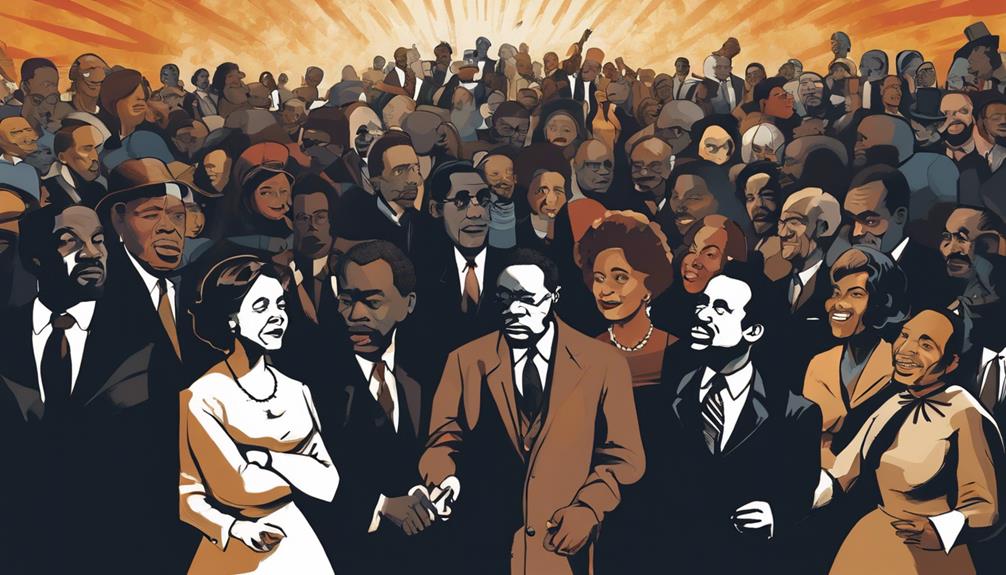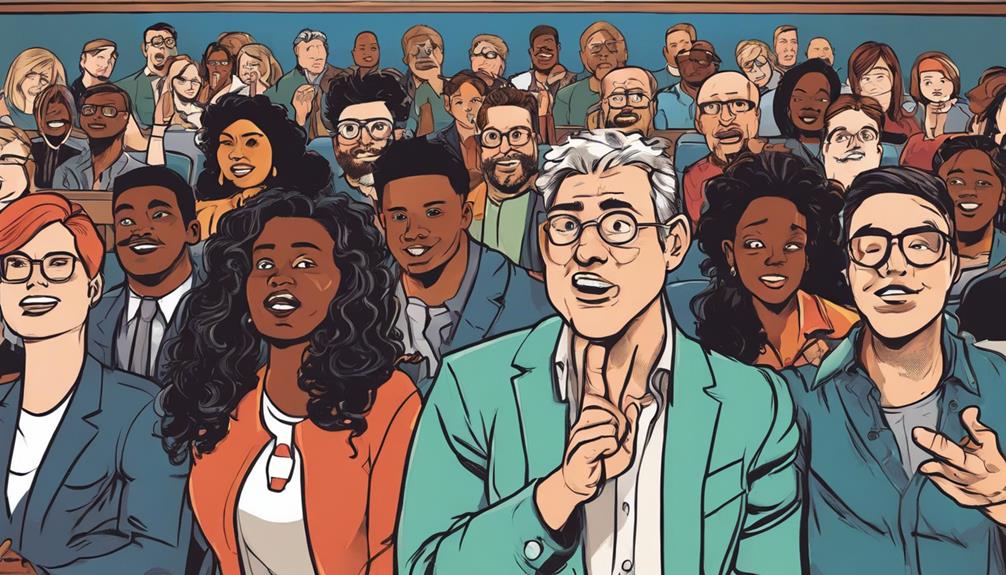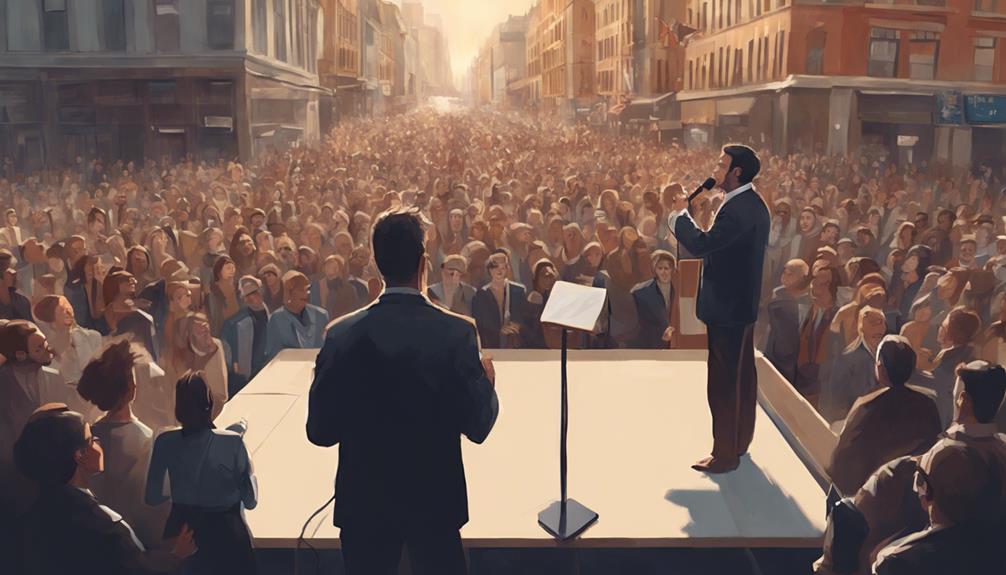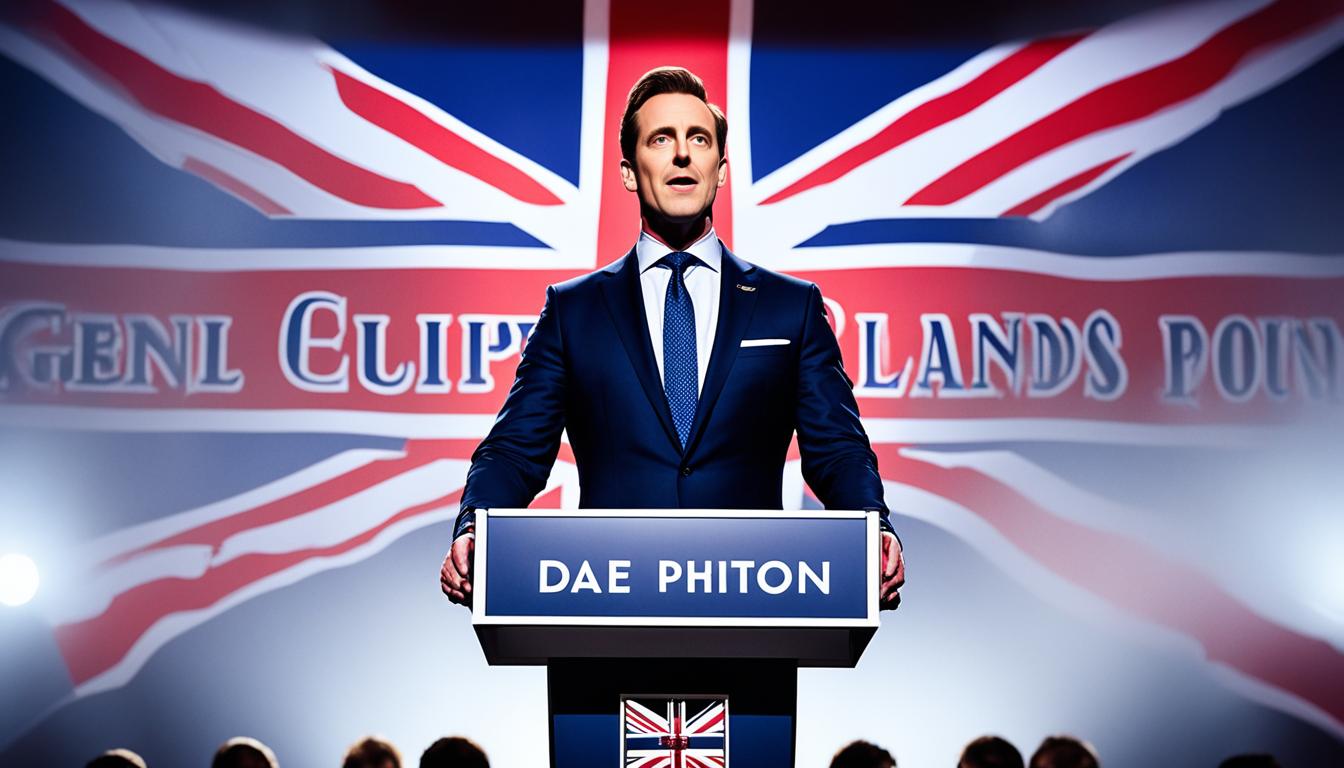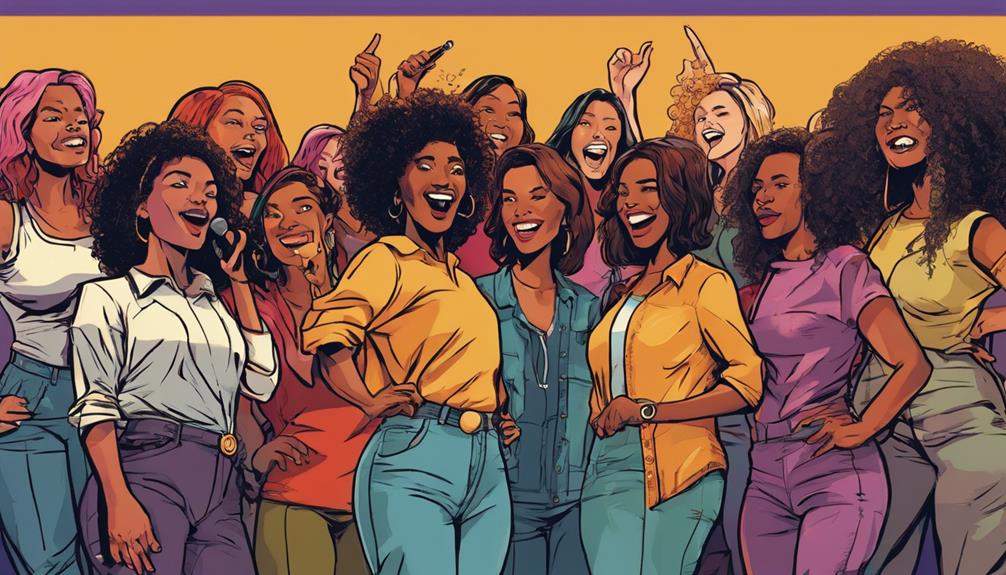Discover the transformative impact of these ten American speakers who left a lasting impression on the nation's history and social progress. From MLK's iconic 'I Have a Dream' speech to Maya Angelou's moving words at the Inauguration, each speech resonates powerfully even today. FDR's Inaugural Address and Lou Gehrig's heartfelt farewell address stand as affirmations of courage and resilience. Explore further into the legacy of these influential figures, including Reagan at the Brandenburg Gate and Muhammad Ali's daring declaration, to uncover the significant influence they had in shaping a nation and inspiring change.
Key Takeaways
- MLK's 'I Have a Dream' speech inspired a nation.
- FDR's New Deal address during the Great Depression was pivotal.
- Maya Angelou's poetry symbolized unity and change.
- Reagan's call to tear down the Berlin Wall was historic.
- Lou Gehrig's farewell speech at Yankee Stadium was iconic.
MLK's 'I Have a Dream' Speech
Delivered on August 28, 1963, during the March on Washington for Jobs and Freedom, Martin Luther King Jr.'s 'I Have a Dream' speech remains a defining moment in American history.
This iconic address by the American civil rights leader called for equality and an end to discrimination, resonating deeply with the nation. MLK's passionate delivery and poignant words, including the powerful phrase 'I have a dream,' stirred the hearts of listeners and inspired a wave of change in the fight for civil rights.
The speech's impact was profound, marking a pivotal moment in the Civil Rights Movement and shaping the course of American history. MLK's vision of a society free from racial injustice continues to be studied and celebrated, reminding us of the ongoing struggle for equality and justice in the United States.
Through his 'I Have a Dream' speech, Martin Luther King Jr. left an indelible mark on the fabric of American society, inspiring generations to pursue a more inclusive and equitable future.
FDR's Inaugural Address
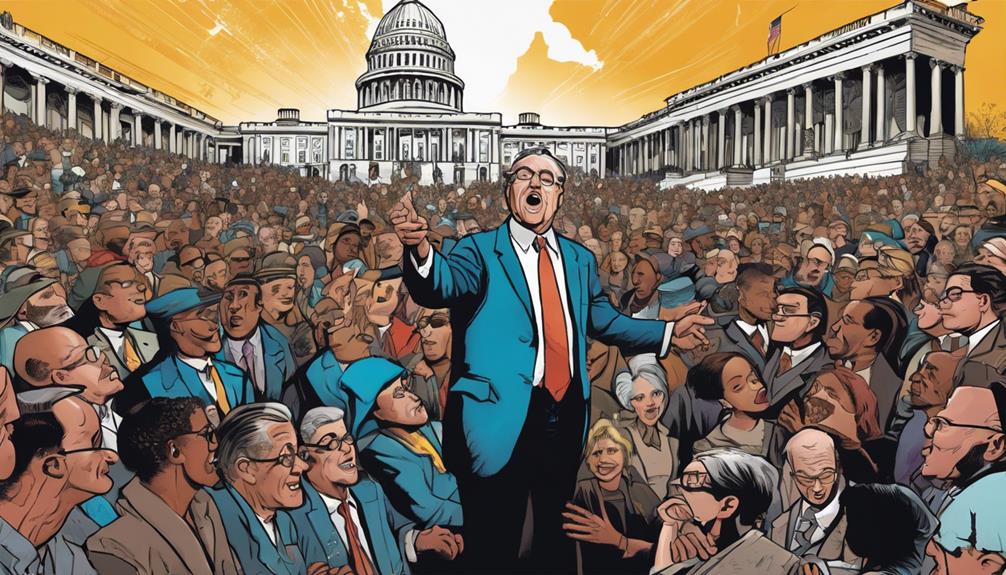
Franklin Delano Roosevelt's inaugural address in 1933, delivered at the peak of the Great Depression, resonated with hope and determination as he famously proclaimed, 'The only thing we have to fear is fear itself.' This iconic speech marked the beginning of FDR's presidency and outlined his New Deal programs aimed at pulling the country out of the economic turmoil it faced. Through his eloquent delivery, FDR instilled confidence in the American people and set the stage for his transformative leadership during one of the nation's most challenging times.
To explore further into the significance of FDR's inaugural address, let's examine a table highlighting key aspects:
| Aspect | Description | Importance |
|---|---|---|
| Hope | FDR's message of hope inspired a nation facing dire circumstances | Instilled confidence |
| Determination | His resolute tone conveyed a commitment to overcome challenges | Showed leadership qualities |
| Unity | Emphasized the need for unity and collective action | Fostered a sense of togetherness |
Maya Angelou at Inauguration
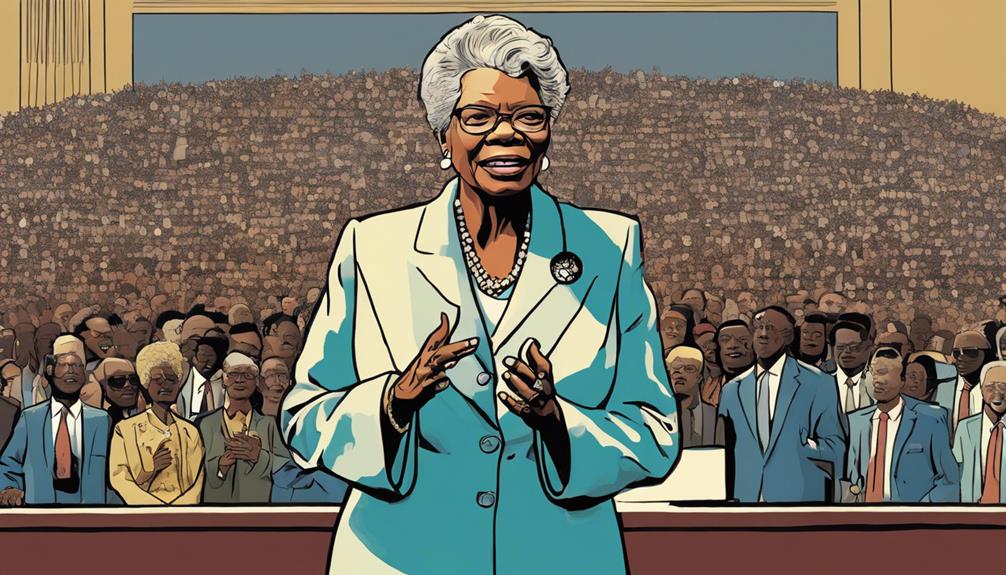
At President Bill Clinton's first inauguration in 1993, Maya Angelou captivated the audience with her powerful poem, 'On the Pulse of Morning.'
As the first African American and female poet to recite a poem at a presidential inauguration, Angelou's presence marked a significant moment in history. Her poem explored themes of unity, hope, and change, resonating deeply with the American public and emphasizing the importance of coming together for progress.
Through her inauguration performance, Angelou not only elevated her own status as a prominent voice for civil rights and social justice but also set a tone for Clinton's presidency. Her inspiring words echoed a message of inclusivity and empowerment, leaving a lasting impact on the nation.
Maya Angelou's contribution to the inauguration wasn't only a literary feat but also a symbolic representation of the ongoing fight for equality and justice in American society.
Lou Gehrig's Farewell
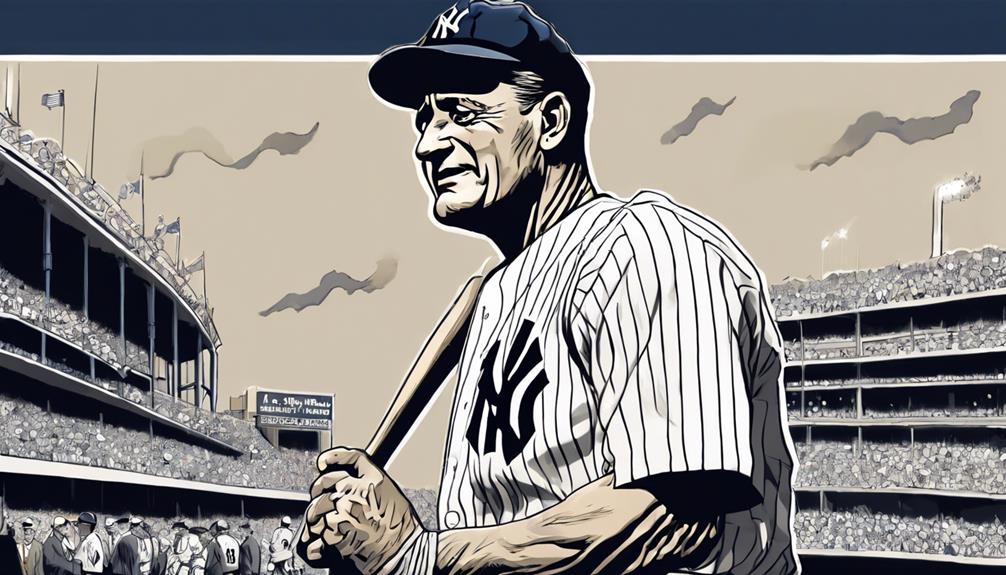
Lou Gehrig's farewell address, famously known as the 'Luckiest Man on the Face of the Earth' speech, was a poignant and unforgettable moment in sports history. Delivered on July 4, 1939, at Yankee Stadium, Gehrig, the iconic New York Yankees baseball player, announced his retirement due to amyotrophic lateral sclerosis (ALS), a disease now associated with his name.
Despite facing a terminal illness, Gehrig's speech radiated grace, humility, and gratitude towards his fans, teammates, and family. His words showcased remarkable strength and character in adversity, making his farewell address one of the most iconic and moving moments in sports history.
Gehrig's resilience and courage continue to inspire generations, emphasizing dignity in the midst of personal hardship. The legacy of his speech transcends sports, serving as a tribute to the human spirit's capacity to find light even in the darkest of times.
Reagan at Brandenburg Gate
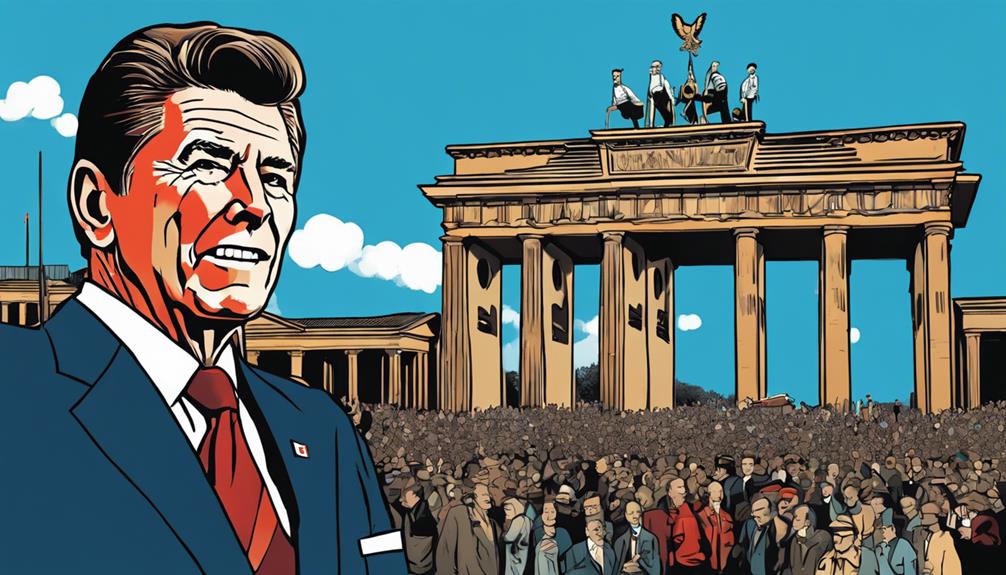
Reagan's speech at the Brandenburg Gate in 1987, where he famously demanded for the Berlin Wall to be torn down, marked a pivotal moment in Cold War history. His bold words challenged the Soviet Union's grip on East Germany, emphasizing themes of freedom and unity that resonated globally.
Reagan's powerful declaration set the stage for the eventual reunification of Germany and the triumph of democracy over oppression.
Reagan's Historic Speech
Near the Berlin Wall in 1987, Ronald Reagan delivered a historic speech at the Brandenburg Gate that included the iconic line, 'Mr. Gorbachev, tear down this wall!' The Berlin Wall stood as a stark symbol of the Cold War division between East and West Germany, and Reagan's bold words directly challenged Soviet leader Mikhail Gorbachev to dismantle this physical and ideological barrier.
In calling for the wall's removal, Reagan advocated for freedom and unity, emphasizing the shared aspirations of the German people for a united nation. This speech is widely regarded as one of Reagan's most memorable moments during his presidency, resonating not only with the citizens of Berlin but also with people around the globe.
Reagan's impassioned plea for the wall's destruction symbolized a turning point in Cold War history, foreshadowing the eventual end of the longstanding conflict between the East and the West.
Impact on Cold War
Ronald Reagan's speech at the Brandenburg Gate in 1987 profoundly influenced the course of the Cold War by advocating for freedom and unity in the face of division and oppression. As Reagan stood before the iconic Berlin Wall, his words echoed a message of hope and defiance that reverberated across the globe:
- The sun casting a golden glow over the divided city.
- Reagan's voice booming with conviction, challenging Gorbachev to tear down the concrete barrier.
- The crowd in Berlin, eyes shining with belief in a future free from tyranny.
- The Berlin Wall, a stark symbol of oppression, looming in the background as Reagan championed democracy.
Reagan's unwavering stance on freedom and democracy in the heart of the Cold War era left an indelible mark on history. His call for unity and liberty at the Brandenburg Gate ultimately played a pivotal role in the eventual fall of the Berlin Wall and the end of the Cold War.
Harvey Milk's Advocacy
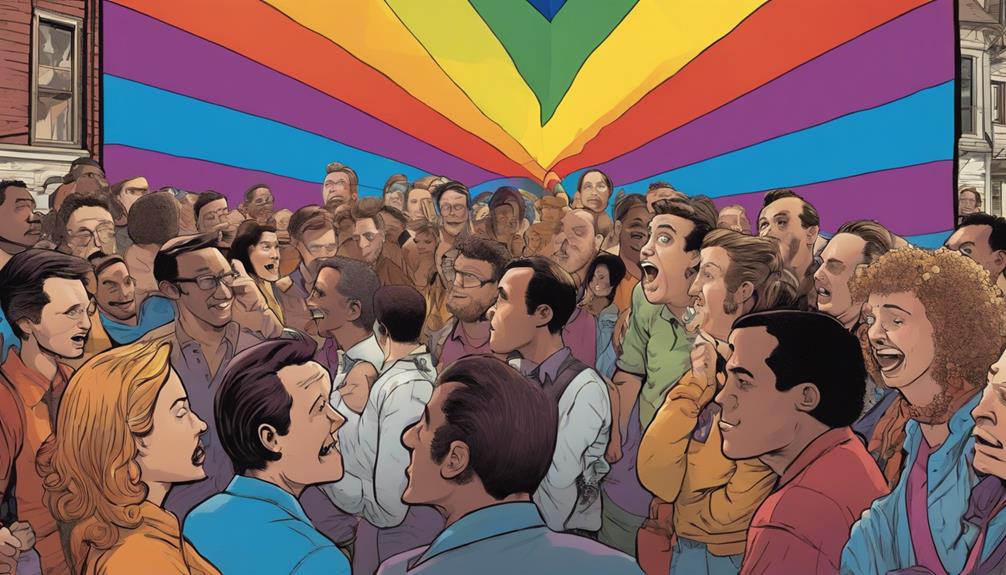
You'll explore Milk's impactful activism, delving into his legacy of advocacy and empowering equality movements.
His unwavering commitment to LGBTQ rights and visibility set him apart as a trailblazer in the fight for equality.
Milk's influence continues to resonate, inspiring generations to stand up for justice and acceptance.
Milk's Impactful Activism
Harvey Milk's impactful activism in advocating for LGBTQ rights marked a pivotal moment in California's history. His relentless efforts focused on promoting equality, diversity, and acceptance within society, leaving an indelible mark on the LGBTQ rights movement. Through his advocacy, Milk aimed to empower marginalized communities and drive social change.
- Empowering the LGBTQ Community: Milk co-founded the Castro Street Fair and Castro Village Association, creating spaces where LGBTQ individuals could come together, celebrate their identities, and support one another.
- Championing Equality: Milk fought tirelessly for equal rights, challenging discriminatory laws and societal norms that hindered LGBTQ individuals from living authentically.
- Inspiring Hope: Milk's assassination in 1978 transformed him into a symbol of hope and activism, inspiring future generations to continue the fight for justice and equality.
- Legacy of Activism: His famous message, 'You gotta give them hope,' serves as a rallying cry for movements advocating for LGBTQ rights and social justice.
Legacy of Advocacy
Milk's advocacy for LGBTQ+ rights left a lasting impact on society, inspiring a legacy of activism and progress. His relentless fight against discrimination and bigotry paved the way for greater rights and equality for the LGBTQ+ community. Through founding the Castro Street Fair and delivering powerful speeches, Milk encouraged visibility and acceptance, sparking a wave of activism that continues to resonate today.
| Legacy of Harvey Milk's Advocacy | |
|---|---|
| Achievements | Impacts |
| – First openly gay elected official in California | – Inspired marginalized communities to advocate for their rights |
| – Founded the Castro Street Fair | – Fought against discrimination and bigotry |
| – Powerful speeches promoting LGBTQ+ visibility | – Sparked a wave of activism for equality |
Harvey Milk's legacy of advocacy serves as a reminder of the importance of standing up for what is right and fighting against injustice. His contributions have had a lasting impact on the LGBTQ+ rights movement, leaving a legacy of progress and hope for future generations.
Empowering Equality Movements
Empowering equality movements, Harvey Milk's advocacy as the first openly gay elected official in California paved the way for progress in LGBTQ+ rights and visibility. His impact reverberates through time, inspiring generations to stand up for equality.
Here's a glimpse into his powerful legacy:
- Establishing the Castro Village Association to uplift the LGBTQ+ community and promote inclusivity in businesses.
- Spreading a message of hope and unity that resonated with marginalized groups, sparking a wave of activism for social justice.
- Encouraging individuals to embrace their authentic selves and fight for their rights, regardless of societal norms.
- Embodying the belief that 'Hope will never be silent,' Milk fueled a movement that continues to drive progress in the fight for equality.
Harvey Milk's unwavering dedication to equality serves as a beacon of light in the ongoing quest for LGBTQ+ rights and social justice.
Muhammad Ali's Proclamation
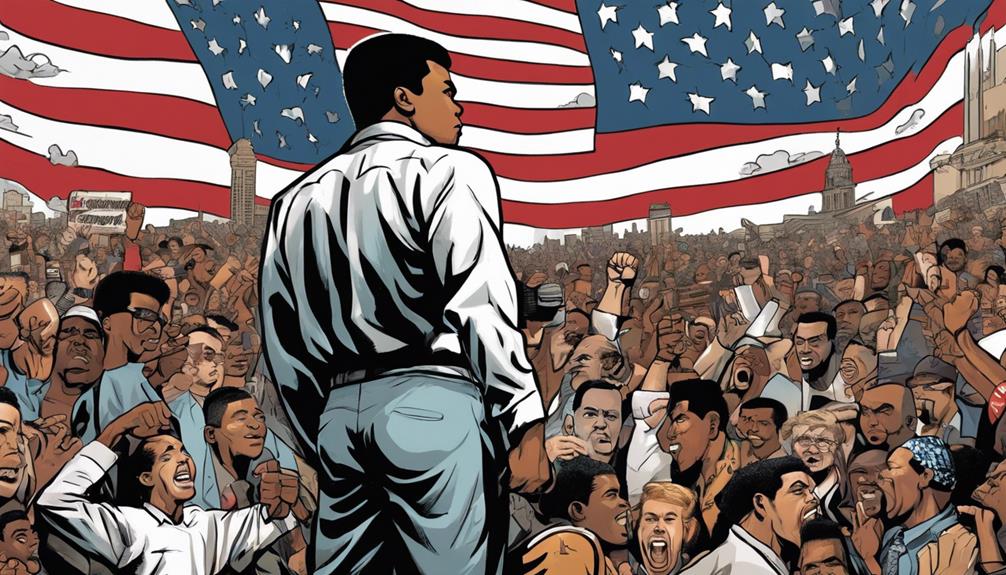
With a resounding declaration of 'I am the greatest,' Muhammad Ali asserted his confidence and charisma before his legendary fight with Sonny Liston in 1964. Ali's bold proclamation not only showcased his self-confidence but also served as a powerful message of empowerment, turning him into a cultural icon revered for his resilience and determination. His words transcended boxing, resonating with millions worldwide and inspiring a generation to believe in themselves.
To visualize the impact of Muhammad Ali's proclamation, consider the following table:
| Keywords | Description | Impact |
|---|---|---|
| Muhammad Ali | Legendary boxer | Icon in sports |
| Proclamation | 'I am the greatest' | Bold self-confidence |
| Empowerment | Inspiring self-belief | Motivated millions |
Ali's boldness in proclaiming his greatness not only redefined sportsmanship but also left a lasting legacy of empowerment and self-assurance for generations to come.
Mandela at Rivonia Trial
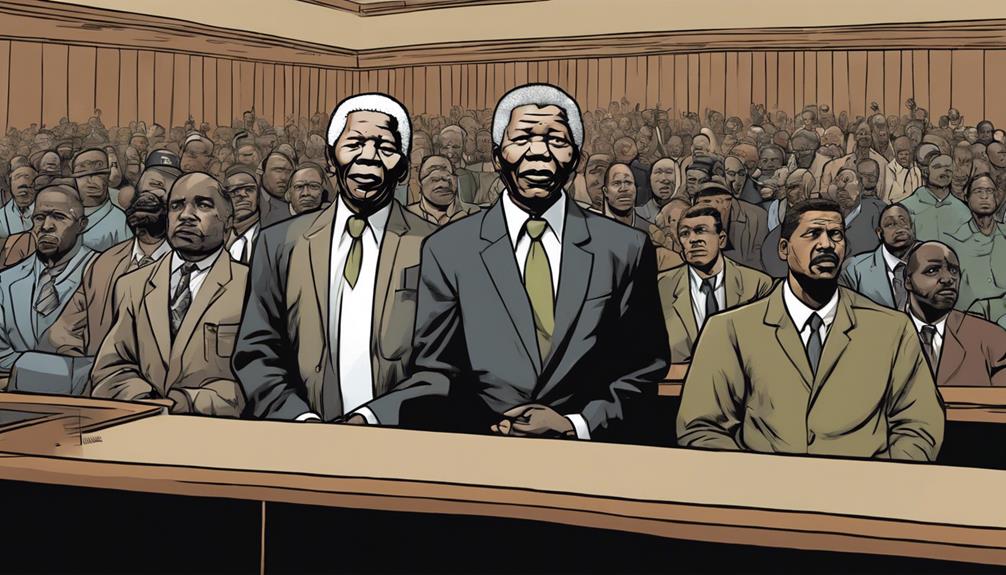
You're about to explore how Nelson Mandela's defiant speech at the Rivonia trial left a lasting impact on the fight against apartheid.
His unwavering courage and commitment to justice became a beacon of hope for those oppressed under the apartheid regime.
Mandela's legacy of standing up against injustice continues to inspire generations to advocate for equality and human rights.
Mandela's Defiant Speech
During the Rivonia trial in 1964, Nelson Mandela delivered a defiant speech that resonated with the ideals of democracy and freedom. Mandela's powerful words challenged the oppressive apartheid regime in South Africa and became a beacon of hope for those fighting for a democratic society based on equality and justice.
- As Mandela stood tall in the courtroom, his unwavering gaze met the eyes of his oppressors, exuding courage and determination.
- The passion in his voice reverberated through the halls, stirring emotions of defiance and resilience in the hearts of all who listened.
- Each word he spoke was like a hammer striking against the chains of injustice, shattering them with the force of his unwavering conviction.
- The air crackled with electricity, charged by Mandela's unwavering commitment to sacrifice everything for the noble cause of freedom and equality.
Impact on Apartheid
Nelson Mandela's defiant speech at the Rivonia trial in 1964 left an indelible mark on the fight against apartheid, solidifying his role as a beacon of resistance and inspiration for those aiming for equality and justice.
Mandela's powerful words resonated not only in South Africa but across the globe, emphasizing the urgent need to dismantle the discriminatory apartheid regime. His unwavering commitment to non-racial democracy and the fight against discrimination showcased his dedication to justice and equality for all.
The Rivonia trial speech, though resulting in Mandela's long imprisonment, sparked a wave of activism and defiance against the oppressive apartheid system. Mandela's courage and determination became a rallying cry for a generation of activists, ultimately contributing notably to the eventual end of apartheid in South Africa.
His legacy as an African American leader who stood against injustice continues to inspire movements for equality and resistance worldwide.
Legacy of Courage
Mandela's unwavering courage during the Rivonia trial underscored his steadfast commitment to justice and equality. In the face of a possible death sentence, Mandela fearlessly stood for what he believed in, advocating for justice and equality with conviction that resonated through the courtroom and beyond.
- The courtroom filled with tense anticipation as Mandela's words echoed the fight against apartheid, each syllable ringing with a call for justice.
- His unwavering gaze met the eyes of oppressors, daring them to deny the inherent equality and freedom of all individuals.
- The weight of his words hung heavy in the air, a reminder of the ongoing struggle for human rights and dignity.
- Mandela's defiance in the face of adversity painted a portrait of courage that would inspire generations to come, leaving an indelible mark on the fight for justice and equality worldwide.
Susan B. Anthony's Demand
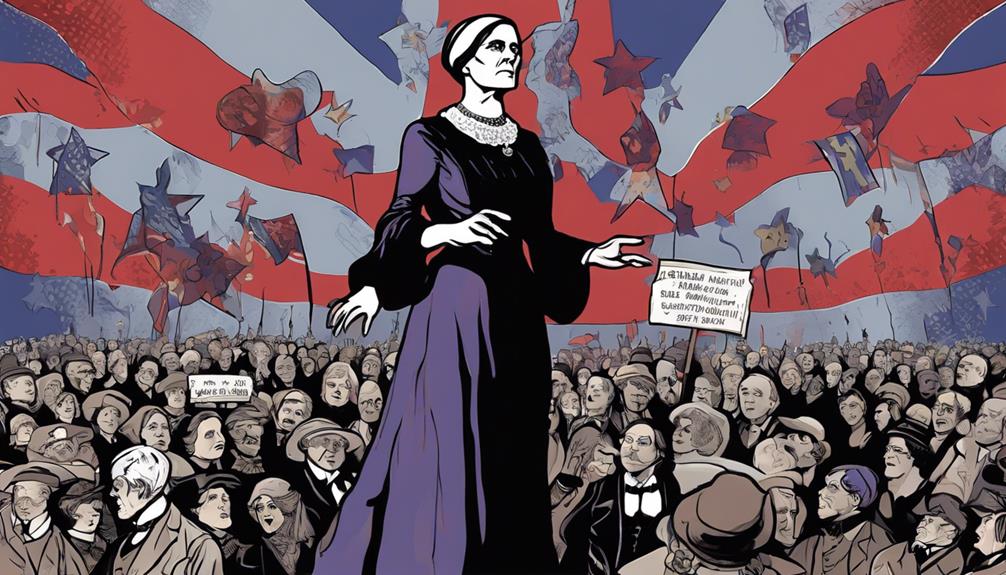
Susan B. Anthony made a bold demand for women's suffrage in her speech at the U.S. House of Representatives in 1873. Her unwavering advocacy for women's suffrage led to her arrest and subsequent trial, where she passionately argued for women's right to vote.
Anthony's demand for equality set a pivotal precedent that laid the foundation for the eventual passing of the 19th Amendment in 1920, which granted women the long-awaited right to vote. Alongside her co-founding of the National Woman Suffrage Association, Susan B. Anthony dedicated her life to championing equal rights for women.
Through her powerful speeches and tireless activism, Susan B. Anthony played an essential role in propelling the women's suffrage movement forward in the United States. Her fearless demand for women's suffrage not only sparked debates but also ignited a movement that would reshape the course of history and pave the way for future generations of women to participate in the democratic process.
Sojourner Truth's Empowerment
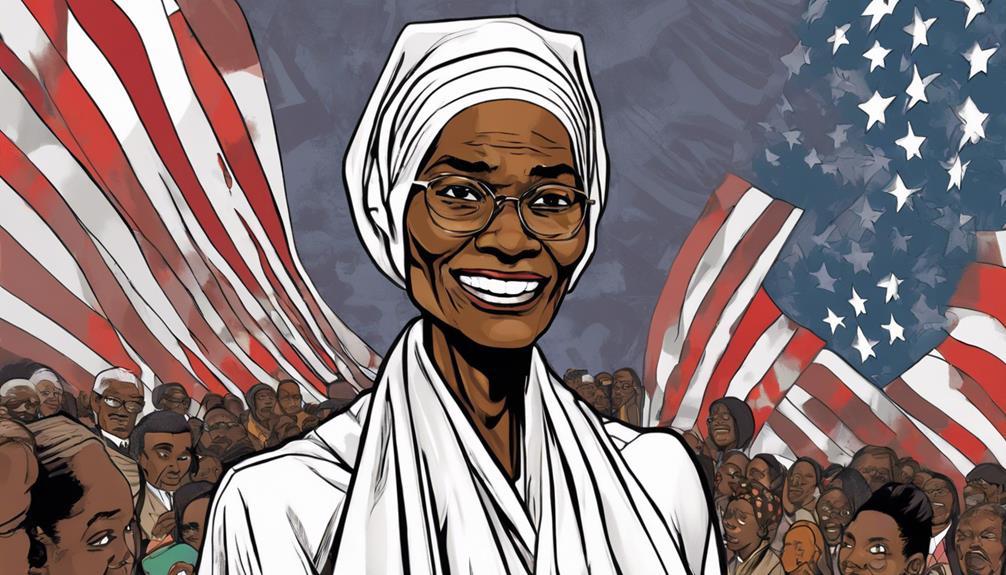
Renowned for her powerful oratory skills and unwavering advocacy, Sojourner Truth's empowerment speeches resonated deeply with audiences, challenging societal norms and inspiring change.
At the Ohio Women's Rights Convention in 1851, her famous 'Ain't I a Woman' speech boldly confronted gender and racial inequalities, leaving a lasting impact on the fight for equality.
Sojourner Truth's voice boomed through the halls, demanding recognition of women of color in the struggle for rights.
Her unwavering gaze met with every pair of eyes in the crowd, igniting a fire of empowerment and resilience.
The echoes of her words reverberated, breaking the chains of oppression and injustice that bound so many.
In that moment, the audience stood united, hearts beating as one, ready to dismantle the barriers of prejudice and discrimination that plagued society.
Sojourner Truth's legacy as a trailblazer for gender and racial equality continues to inspire generations to stand up against injustice and fight for a more equitable world.
Frequently Asked Questions
Who Was America's Greatest Orator?
So, you wanna know who America's greatest orator was? Well, get ready for this bombshell – it's Abraham Lincoln! His speeches during the Civil War, like the Gettysburg Address, were pure gold.
Who Was One of the Greatest Orators in American History?
One of the greatest orators in American history was Abraham Lincoln. His powerful speeches, including the Gettysburg Address and Second Inaugural Address, emphasized equality, freedom, and democracy, leaving a lasting impact on society.
Who Is the Greatest Public Speaker of All Time?
When pondering who is the greatest public speaker of all time, consider various perspectives. Reflect on impactful figures like Martin Luther King Jr., Winston Churchill, Abraham Lincoln, Franklin D. Roosevelt, and Ronald Reagan for inspiration.
Who Is Known as the Most Significant Rhetorician of All Time?
You might argue many, but Cicero stands out as the most significant rhetorician of all time. His mastery of Latin rhetoric and enduring influence make him an unparalleled figure in the history of public speaking.
How Did Ancient Orators Shape Public Speaking in America?
Ancient roman orators speaking role played a significant part in shaping public speaking in America. The persuasive techniques and powerful delivery of speeches from figures like Cicero and Quintilian heavily influenced the style and substance of public discourse in the United States. Their legacy continues to impact public speaking today.
Conclusion
You've just scratched the surface of the incredible impact these American orators had on shaping our nation's history. From MLK's iconic 'I Have a Dream' speech to Mandela's powerful words at the Rivonia Trial, these speeches continue to inspire and empower us today.
So next time you feel like throwing in the towel, remember the wise words of Lou Gehrig: 'Today, I consider myself the luckiest man on the face of the earth.' Keep on fighting the good fight, champ!

